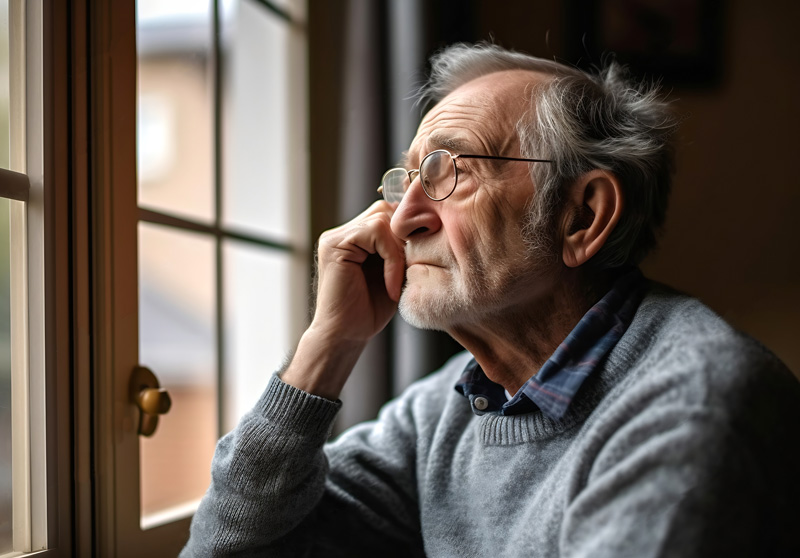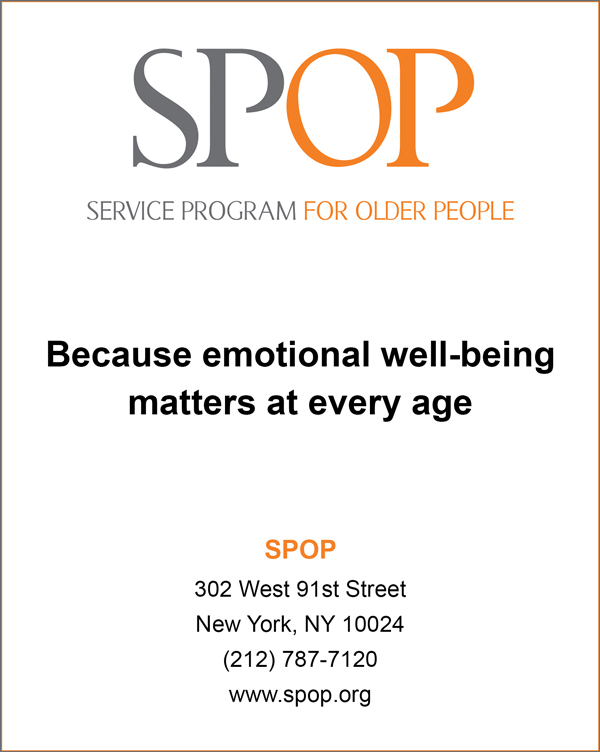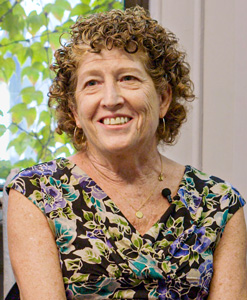Last winter “Lucy,” an 87-year-old woman, was referred to Service Program for Older People (SPOP) by her primary care doctor. Lucy’s husband had died during the COVID-19 pandemic, and she was struggling with unresolved grief, depression, and panic attacks. A retired teacher, she had enjoyed a long marriage and an active social life, and she felt overwhelmed by unaccustomed feelings of isolation and loneliness. We matched her with a therapist trained in complicated grief, and we also encouraged her to enroll in a peer-led bereavement support group. During the course of treatment Lucy focused on learning techniques to manage anxiety, and over time she opened up more and expressed concern that the glass of wine that she enjoyed with dinner increased to two or three each evening since her husband’s death.

After a few months of treatment, Lucy began to recognize how a 12-step program could support her goals and enhance her individual therapy. She has now discontinued alcohol consumption, and she recognizes that her reliance on it was linked to the social isolation she had experienced, together with suppressed emotions associated with grief and the pandemic. She feels that she has moved beyond grief and is once again socializing with friends. At age 87 she feels stronger, healthier, and more independent.
Lucy’s story is a stark reminder that, even though there is ample data showing that substance misuse increased during the pandemic, it is still easy to overlook it in an older population. At intake Lucy completed a screening for alcohol and substance misuse, but her focus was on her grief and depression, and she didn’t consider that self-medicating with alcohol was a serious issue.
This is a familiar pattern in our clinic. SPOP is the only agency in New York City that is entirely dedicated to providing community-based mental healthcare for adults aged 55 and older. We operate a licensed behavioral health clinic that offers individual and group psychotherapy, psychiatry service, mental health screenings, assessments for social determinants of health, and connections to other providers for case management, meals assistance, or other concrete needs. We serve some 2,000 adults each year, and our client population is overwhelmingly low-income, medically frail, and socially isolated.
We have seen a significant increase in substance misuse in our client population over the past three years. During the pandemic some clients relapsed after years or even decades of sobriety, and others started to over-use alcohol, prescription medications, or other substances for the first time. One common theme that emerged was a tendency for individuals to underestimate the impact that substance use had on their well-being.
Our clinic staff is trained in modalities to treat the whole person, taking into consideration mental and physical health, family and interpersonal dynamics, social isolation, and other factors. This holistic approach allows us to honor the client’s most pressing concerns while also discovering underlying patterns of behavior. In the case of substances, the client may not recognize a pattern of misuse until there is a physical or emotional crisis. For instance, an older person who may have been comfortable with heavy substance use earlier in life may find that they now struggle with increased irritability, insomnia, or unexpected falls – but they do not connect these symptoms to substance use until they have experienced an injury or other crisis.
We also work in partnership with outpatient substance abuse clinics in the region to make certain that our clients have access to treatment for addiction while our clinic focuses on the underlying mental health condition. That additional support is often critical to the client’s success in achieving their goals.
There is no question that older New Yorkers suffered during the pandemic as they endured months of social isolation, food insecurity, emotional trauma, fear, anxiety, and, in many cases, the loss of friends and loved ones. At SPOP we are seeing this situation play out with increased urgency of cases, and greater numbers of adults experiencing substance misuse, symptoms of trauma, or complicated grief. Stories like Lucy’s are a reminder that substance use may look different in an older person – and that we can all grow and change at any age.
Nancy Harvey, LMSW, is Chief Executive Officer of Service Program for Older People (SPOP). Visit www.spop.org to learn more about SPOP and its work as a community-based mental healthcare provider for older adults.








